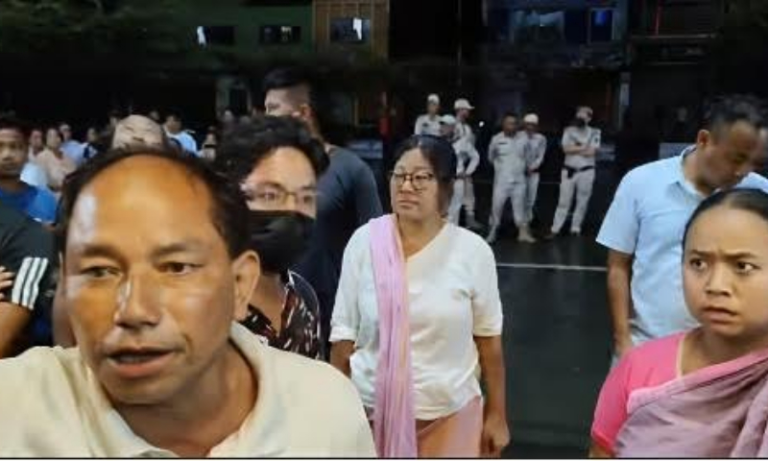UP Court Hands Life Sentence to Man for Raping His Mother: A Case of Unimaginable Betrayal
Summary
A court in Uttar Pradesh has sentenced a man to life imprisonment for raping his mother. The incident, which has shocked the community, highlights the severity of sexual violence within families and the lasting psychological damage such cases cause to victims. The verdict serves as a grim reminder of the growing concerns about sexual abuse in India and the importance of enforcing strict legal consequences.
Introduction: The Deep Wound of Familial Betrayal
Sexual violence is one of the most horrific crimes a person can endure. When the perpetrator is a family member, the trauma is amplified. This case from Uttar Pradesh, where a man was sentenced to life imprisonment for raping his own mother, is not only tragic but also deeply unsettling. The very foundation of trust—family—was shattered in the most devastating way. This article delves into the complexities of this case, the broader implications of such crimes, and what society needs to do to prevent these heinous acts.
The Case Overview: A Crime Against Nature
In a shocking incident from Uttar Pradesh, a man was convicted of raping his mother, resulting in a life sentence handed down by the court. The mere mention of such a crime raises intense emotions—anger, disgust, and sorrow. The legal system has acted swiftly, but the scars left on the victim and the community will take much longer to heal.
The Incident
The incident took place in the accused’s residence, where he assaulted his mother in a state of intoxication. While specifics of the crime are difficult to fathom, it serves as a reminder that sexual violence knows no boundaries—not even familial ties. It highlights a grim reality—there are people who abuse their authority and familial trust in unimaginable ways.
Why Crimes Within Families Are Particularly Traumatic
When someone is sexually assaulted by a stranger, the trauma is intense, but when the perpetrator is a family member, the psychological toll can be even greater. This type of abuse carries unique implications.
Breach of Trust
Family is often a source of safety and security. When a trusted family member commits such a vile act, the victim’s sense of safety is completely destroyed. They lose not only their sense of self but also their sense of belonging in their own family.
Isolation and Shame
Victims of familial sexual abuse often feel isolated and ashamed. They may not speak up for fear of breaking up the family or facing retaliation. Society, too, often stigmatizes such victims, making it difficult for them to come forward. The result is prolonged suffering, both emotional and physical, for the victim.
Long-Term Psychological Impact
The mental health effects of such crimes are long-lasting. Victims may experience depression, anxiety, post-traumatic stress disorder (PTSD), and even suicidal thoughts. The betrayal by a family member can leave them unable to trust anyone in the future, creating barriers to forming healthy relationships.
The Legal System’s Role: Delivering Justice Swiftly
The Uttar Pradesh court acted decisively in this case, handing down a life sentence to the perpetrator. The law in India is clear on the gravity of sexual crimes, especially those involving minors or family members.
POCSO Act and IPC Provisions
India has stringent laws under the Protection of Children from Sexual Offenses (POCSO) Act and the Indian Penal Code (IPC) to address cases of sexual violence. Section 376 of the IPC, which deals with rape, carries severe penalties, including life imprisonment for cases involving family members. The legal system, however, must not only be stringent but also swift, as in this case, to ensure that justice is delivered without unnecessary delay.
Challenges in Legal Proceedings
While the court’s decision in this case is commendable, not all such cases see swift justice. Often, victims are hesitant to report crimes, and even when they do, the judicial process can be slow, exacerbating the victim’s trauma. Furthermore, societal pressures often prevent victims from coming forward.
The Societal Responsibility: Shifting Attitudes Toward Victims
While legal systems can punish the perpetrators, society plays a crucial role in helping victims heal and preventing such crimes in the future.
Breaking the Silence Around Familial Abuse
Many times, familial sexual abuse goes unreported due to societal stigma. Families, particularly in conservative societies like India, may choose to hide the crime to “protect” the family’s reputation. This silence only empowers the abuser. As a society, we must encourage open conversations around these issues, emphasizing that the victim is never to blame.
Providing Support Systems
Victims of such heinous crimes need robust support systems, including counseling, legal aid, and financial support. NGOs, community organizations, and the government must work together to create environments where victims feel safe to report crimes and seek justice.
Gender Sensitization and Education
Education is crucial in changing societal attitudes. We must teach children about consent, personal boundaries, and the importance of speaking up when they feel uncomfortable. Gender sensitization programs should be a mandatory part of education, emphasizing the equal dignity of all individuals, regardless of gender.
How Can Such Crimes Be Prevented?
While legal punishment is essential, the focus should also be on prevention. Preventing crimes like rape—especially those involving family members—requires a multi-faceted approach.
Stricter Enforcement of Laws
India’s laws regarding sexual violence are comprehensive, but enforcement can be inconsistent. Police officers and other law enforcement personnel must be better trained to handle cases of sexual violence with sensitivity and urgency.
Awareness Campaigns
Government and non-governmental organizations need to work together to run awareness campaigns that educate the public on the seriousness of sexual violence, especially within families. These campaigns should also aim to reduce the stigma attached to victims of such crimes.
Counseling and Rehabilitation Programs for Perpetrators
Though the focus should always be on supporting the victim, rehabilitation programs for perpetrators can help prevent repeat offenses. While such crimes are inexcusable, offering psychological counseling to perpetrators may help address the root causes of their violent behavior.
The Role of Media in Exposing and Preventing Familial Abuse
Media coverage of sexual abuse cases is a double-edged sword. On one hand, it can help expose the crime and hold perpetrators accountable. On the other hand, sensationalizing such cases can cause further trauma to the victim and their family.
Ethical Reporting
Journalists covering cases of familial sexual abuse must approach their reporting with sensitivity. Victims’ identities should be protected, and the focus should remain on the systemic issues that enable such crimes to occur. Media can also play a vital role in raising awareness about the prevalence of familial sexual abuse, encouraging victims to speak out.
Conclusion: A Need for Collective Action
The conviction in this case sends a strong message: crimes of sexual violence, especially within families, will not go unpunished. However, the road to preventing such horrific acts is long and requires collective action. Legal reforms, societal change, and awareness are all critical components of this journey.
Only when families, communities, and the legal system come together can we hope to put an end to these despicable crimes. And only then can victims find the justice and healing they deserve.
FAQs
- What sentence did the court give to the man for raping his mother?
The court handed him a life sentence for the crime. - Why is familial sexual abuse particularly traumatic?
Familial abuse breaches trust, isolates the victim, and has long-term psychological effects, making it more traumatic than abuse by strangers. - What laws protect victims of sexual abuse in India?
The POCSO Act and IPC provisions like Section 376 ensure strict penalties for sexual offenders, especially in cases involving minors or family members. - Why do victims often not report familial abuse?
Victims may fear societal judgment, family breakdown, or retaliation, leading to underreporting of such crimes. - How can society prevent sexual violence within families?
Through open conversations, awareness campaigns, better legal enforcement, and support systems for victims, society can help prevent such crimes.



